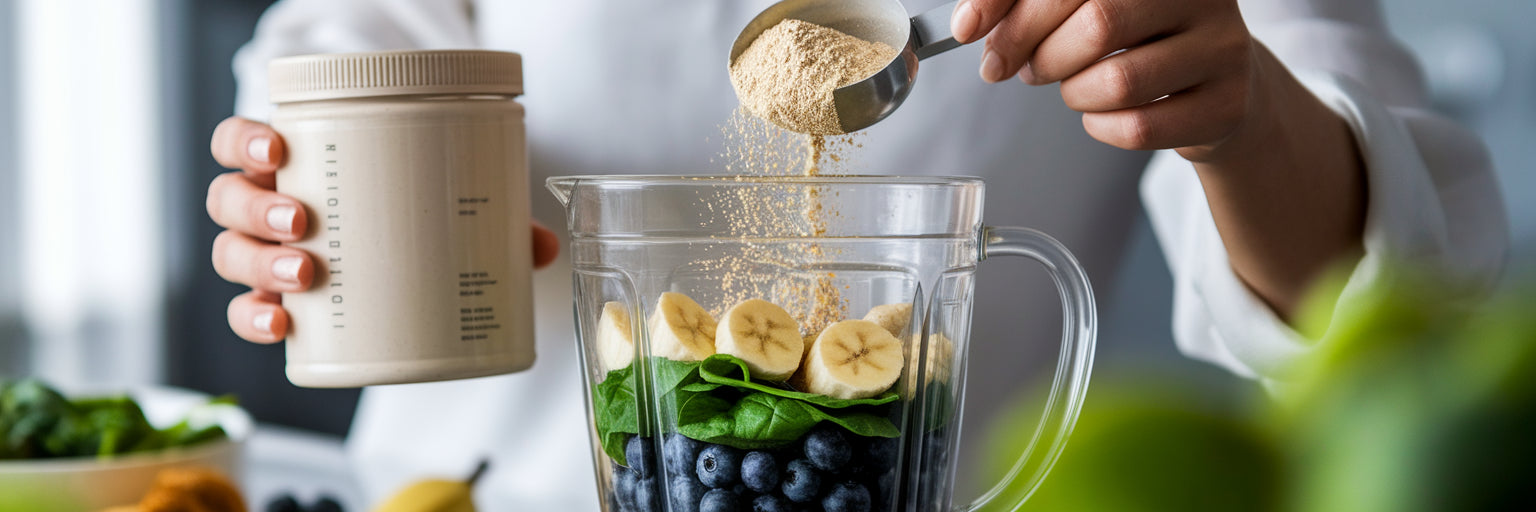Starting Your Plant-Powered Fitness Journey
Walking into a health store or browsing online for supplements in the U.S. can feel a bit like standing in a packed stadium. The options are endless, which is exciting, but also pretty overwhelming. If you've ever felt lost in a sea of tubs and labels, you're not alone. This guide is here to be your friendly, clear-cut map, helping you navigate the world of plant-based protein with confidence.
Choosing the right vegan protein powder is about so much more than just building muscle. It’s a decision that supports your energy levels, contributes to better digestive health, and complements your overall wellness. Think of it as finding the perfect partner for your fitness ambitions. The right supplement should work with your body, not against it, helping you feel strong and vibrant from the inside out.
So, let's break it down. We'll walk through exactly how to choose vegan protein powder by looking at a few key things: matching the protein content to your personal goals, learning to read ingredient labels, finding a flavor you genuinely look forward to, and even considering the environmental footprint of your choice. By the end, you'll have everything you need to make a smart decision for your health journey, which you can learn more about on our blog.
Matching Protein Content to Your Fitness Goals
Before you pick a powder, it’s helpful to ask: what am I trying to achieve? Not all protein goals are the same, and your choice should reflect your unique needs. Most quality vegan protein powders offer between 15 to 25 grams of protein per serving, a versatile range that covers most bases. The key is to align that number with your daily activity and fitness objectives.
Let's get practical. Here’s a simple breakdown to help you find your sweet spot:
- For Muscle Building: If your focus is on strength and recovery, aim for the higher end of the spectrum, around 20-25 grams per serving. Consuming this amount, especially after a workout, helps support muscle repair and growth. This is the ideal range when looking for a vegan protein for muscle gain.
- For Weight Management: A serving with 15-20 grams of protein can be a fantastic tool. It helps increase feelings of fullness, which can curb snacking, and supports the preservation of lean muscle when you're in a calorie deficit.
- For General Wellness: If you're simply looking to supplement a balanced diet and ensure you're getting enough protein daily, a moderate amount in that 15-20 gram range is often perfect to fill any nutritional gaps.
You'll also hear about "complete protein," which just means it contains all nine essential amino acids your body can't make on its own. Many plant-based powders use a blend of sources, like pea and rice protein, to achieve this full profile. As noted in a Health.com article, choosing a powder that has been independently tested is also crucial for ensuring you're getting what the label promises. Take a moment to think about your activity level—are you training for a marathon or looking for a daily wellness boost? Your answer will point you to the right protein target.
Decoding the Ingredient Label Like a Pro

The ingredient list is where a product tells its true story. Becoming comfortable reading it is the single best skill you can develop to find a high-quality powder. A shorter, more recognizable list is almost always a sign of a better product. It means the focus is on the protein, not on cheap fillers or artificial additives.
Common Plant Protein Sources
Most vegan powders in the U.S. are built on a few key plant sources. Each has its own unique benefits, and understanding them can help you find the perfect match for your body.
| Protein Source | Key Benefit | Best For... |
|---|---|---|
| Pea Protein | Smooth texture, rich in BCAAs | Muscle building and recovery |
| Brown Rice Protein | Hypoallergenic and easily digestible | Individuals with sensitive stomachs |
| Hemp Protein | Contains omega-3s and fiber | Overall wellness and nutritional balance |
| Soy Protein | Complete amino acid profile | An all-around, effective protein source |
What to Avoid on the Label
Just as important as what's in your protein is what's not. When your goal is a clean ingredient protein powder, knowing what to skip is essential for avoiding additives in supplements. Keep an eye out for these common culprits:
- Excessive Gums: Ingredients like xanthan gum or guar gum are used as thickeners. In small amounts they're fine, but too much can cause bloating or digestive discomfort for some people.
- Artificial Sweeteners: Sucralose, aspartame, and acesulfame potassium are common. If you prefer to avoid them, look for powders sweetened naturally with stevia or monk fruit.
- Fillers and Artificial Ingredients: A long list of chemical-sounding names is a red flag. Your protein powder shouldn't read like a science experiment. For example, our chocolate vegan protein is made with a simple, clean list of ingredients you can actually pronounce.
For extra peace of mind, look for a third-party testing seal like NSF Certified for Sport. This certification verifies that the product is free from contaminants and banned substances, giving you confidence in its purity.
Finding a Flavor and Texture You'll Actually Enjoy
Let's be honest: if you dread the taste of your protein shake, you're not going to drink it consistently. The best supplement in the world is useless if it just sits in your pantry. Finding a flavor and texture you genuinely like is non-negotiable for long-term success.
The classic chocolate and vanilla flavors are popular for a reason—they're reliable and mix well with simple ingredients like plant-based milk or water. However, don't overlook unflavored options. An unflavored powder is a blank canvas, perfect for adding to savory dishes like soups, mixing into oatmeal, or creating custom smoothies without altering the taste. If you love getting creative in the kitchen, you can find some great ideas in these easy vegan protein recipes.
Texture is the other half of the experience. We've all had that chalky, gritty shake that's tough to swallow. The protein source plays a big role here. Rice protein can sometimes have a slightly gritty mouthfeel, while pea protein is known for being smoother. Many of the best powders use a blend to create a balanced, pleasant texture. Sweeteners also affect the overall taste; natural options like stevia and monk fruit have a different flavor profile than artificial ones. The only way to know what you prefer is to try them. A great pro tip? Before committing to a giant tub, buy a few single-serving packets of different brands and flavors to see what you like best.
Considering Sustainability and Ethical Choices

For many of us, choosing a plant-based lifestyle is a decision rooted in more than just personal health; it's also about making a positive impact on the planet. This mindset shouldn't stop at your dinner plate. Your choice of a supplement can be an extension of these values, especially when you look for sustainable protein supplements.
Some plant protein sources are inherently more eco-friendly than others. As explored by publications like Wellbeing Nutrition, crops like hemp and pumpkin seed are often celebrated for their resilience and lower resource requirements, such as needing less water to grow. Choosing powders made from these ingredients can be a great way to align your purchase with your environmental principles.
The commitment to sustainability goes beyond the powder itself. Take a look at the packaging. Does the brand use post-consumer recycled (PCR) materials? Is the container biodegradable or easily recyclable? These details signal a company's dedication to reducing its footprint. Ultimately, brand transparency is key. Companies that are open about where their ingredients are sourced and how their products are made demonstrate a level of accountability that resonates deeply with conscious consumers across the U.S.
Your Smart Comparison Checklist
You've done the research and have narrowed it down to a few options. Now it's time to make the final call. Use this simple checklist to compare your top contenders side-by-side and confidently choose the best plant based protein powder for you.
- Nutrition Alignment: Does the protein-per-serving match my fitness goal? Take a quick look at the sugar and fiber content, too. More fiber is generally a plus, while lower sugar is ideal for most goals.
- Ingredient Integrity: Is the ingredient list short, clean, and easy to understand? Is it third-party tested for purity? Most importantly, does it contain any of the additives you want to avoid?
- Cost Per Serving: Don't just look at the price of the tub. Divide the total cost by the number of servings to find the true price per scoop. This is the best way to compare value.
- User Reviews: What are other people saying about the taste and mixability? Look for patterns in the comments, not just one-off reviews. If dozens of people say a flavor is too sweet, they're probably right.
With this checklist in hand, you're ready to put your new knowledge to the test. Feel free to browse our curated collections to see these principles in action.
Making Your Final Choice with Confidence

At the end of the day, the "best" protein powder is the one that works for you. It's a personal choice that balances your fitness goals, taste preferences, budget, and personal values. The goal isn't to find a single perfect product, but to find the one that seamlessly fits into your life and supports your health journey.
You now have all the tools you need to read labels like an expert, ask the right questions, and make an informed decision you can feel great about. This isn't just another item on your shopping list; it's a positive and empowering step toward your wellness goals.
If you found this guide helpful, feel free to share it with a friend who might be on a similar journey. And when you're ready, we invite you to explore everything we have to offer here at Beyond Good Foods.



